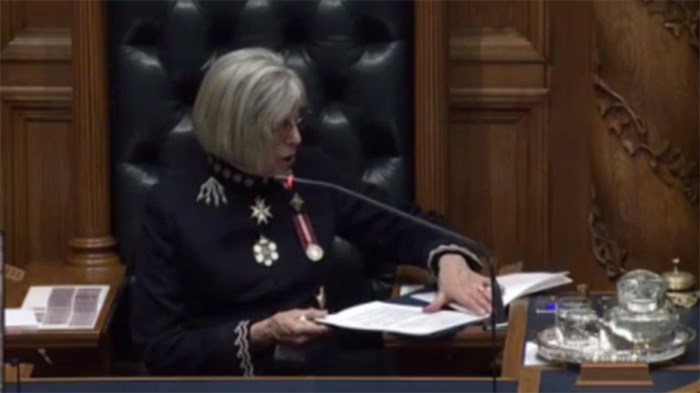 Lt.-Gov. Judith Guichon delivered a Throne speech February 13 that was very different in tone from economy and job-focused speeches under the previous Liberal government.
Lt.-Gov. Judith Guichon delivered a Throne speech February 13 that was very different in tone from economy and job-focused speeches under the previous Liberal government.
British Columbia is about to embark on a massive social spending spree that will see increased government spending on housing, child care, hospitals, schools and playgrounds and embark on a range of studies and reviews on everything from hydraulic fracturing to the risks of pipeline spills.
In its Throne speech Tuesday, February 13, the new NDP government sketched out its long-range plan for B.C., which includes the “single largest investment in B.C. history” for both housing and child care.
If Alberta Premier Rachel Notley was tuning in to see if the NDP government in B.C. would dial back its attack on the Trans Mountain pipeline expansion, she would have been disappointed.
Lt.-Gov. Judith Guichon made it clear the NDP government plans to move ahead with its plans to try to place new restrictions on increased volumes of diluted bitumen from Alberta – something that has already triggered a trade war with Alberta.
“The people of B.C. expect government to protect our coast and inland waterways from the significant harms an oil spill would cause,” Guichon said. “Government is considering new protections that would improve our ability to prepare for and respond to bitumen spills.”
British Columbians will have to wait until next week’s first full budget to know just how much the NDP government’s new social spending programs will cost.
But pledges that the government will make the largest investments ever in both housing and child care suggest new taxes or deep deficits may be needed, especially in light of recent revelations that ICBC is facing a massive deficit.
“British Columbians want better public services, like quality health care for patients and world-class education system that sets up our children for success,” Guichon said. “And British Columbians expect to share in the economic prosperity B.C. enjoys.”
Greg D’Avignon, CEO of the Business Council of British Columbia, said many of the priorities in the throne speech are also priorities for business, since affordability is important to attracting and retaining workers.
But Tuesday’s Throne speech focused primarily on spending, and had little to say about wealth generation.
“It actually touches on a lot of important issues for business and for private citizens,” D’Avignon said. “We want to make sure we increase the quality of life that we really enjoy in British Columbia.
“But it can’t all be about spending – it has to be about creating. We’re looking forward to the government’s steps that it will take to reduce complexity, reduce costs, reduce the time to decisions, create more certainty for people in business to invest capital.”
The centerpiece of the government’s new spending plans is housing and housing affordability.
“Starting this year, government will begin to make the largest investment in affordable housing in B.C.’s history, including social housing, student housing, senior housing, indigenous housing and affordable rentals for middle-income families,” Guichon said.
She added the government will also make the largest investment in 20 years in retrofits and renovations for existing social housing, in order to preserve existing low-income rental housing stock.
Housing related spending and other initiatives that will be in next week’s budget will include:
• a new Housing Hub that will partner with non-profits to build new affordable housing;
• new restrictions on real estate speculation, and real estate-related tax fraud and evasion and money laundering;
• new safeguards to protect renters against renovictions; and
• enhanced grants for low-income renters and seniors.
One of the central planks in the NDP’s platform prior to the last election was $10 a day daycare, a commitment calculated to cost $1.5 billion annually.
That $10 figure was nowhere in Tuesday’s Throne speech, although, like housing, child care will also receive what Guichon described as the single largest investment in B.C.’s history.
The government plans to increase access to government licensed day care, and will “dramatically increase” the training of early childhood educators.
Asked if his government is backing away from its $10 a day care pledge, Premier John Horgan told reporters, “beside housing, it will be the centerpiece of our budget next week. There is no backing away from anything.”
During last year's provincial election campaign, the Green Party disagreed with $10 a day child care, campaigning, instead, on free child care, but only for children up to the age of three, followed by free preschool for children aged four and five.
Even so, Green Party Leader Andrew Weaver generally praised the Throne speech, including the commitments to increased spending on child care.
“While it’s positive to see a focus on childcare, going forward we hope to see far more emphasis on the importance of high quality early childhood education,” he said. "We have a once-in-a-lifetime opportunity to provide the next generation of British Columbians with the best possible head start - and well paid, high quality educators must be at the centre of this transformation.
Other spending priorities to look for in next week’s first full budget will include:
• a new poverty reduction strategy;
• 2,900 new tech-related spaces at colleges and universities;
• action to reduce surgical wait times;
• team-based health care to reduce pressure on emergency rooms;
• increased spending to ensure caregivers spend more time with seniors in their care;
• a comprehensive review of B.C.’s coastal ferry service;
• a review of fugitive methane emissions in the natural gas sector.
@nbennett_biv


